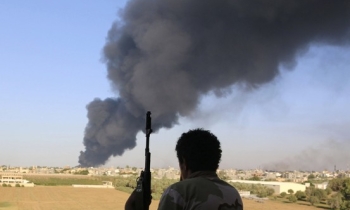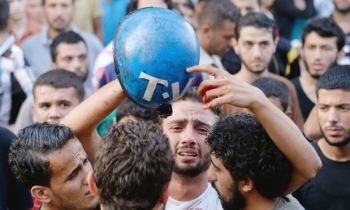With just a day to go for the March 19 presidential election in Belarus, there are growing international concerns about the institutionalised harassment of the news media by present incumbent Aleksandr Lukashenko. Lukashenko is seeking a third term in a vote that the Organisation for Security and Cooperation in Europe (OSCE) said "fell significantly short" of democratic standards.

Interior Minister Vladimir Naumov told journalists at a press conference in capital Minsk on March 16 that the ministry cannot "guarantee their safety" in case of public demonstrations on election weekend. "If a crowd gathers on Oktyabrsk Square in Minsk and you get in the crowd and start some kind of actions there, who will be able to guarantee you safety?" the news agency Belta quoted the minister as saying.
Belarusian Security Service chief Stepan Sukhorenko told a Minsk news conference the same day that opposition supporters who take to the streets and "destabilise the situation" will be charged with terrorism, Agence France-Presse reported. If sentenced, protesters could face "up to 25 years, or life in prison, or capital punishment," he said.
According to Reporters sans Frontières (RSF), during its 12-year rule, the Lukashenko regime has virtually eliminated the independent press and has wiped out the opposition media. Lukashenko, condemned in the west as Europe's last dictator, regards the news media as "the main measuring device of ideology, at the base of the state." Government propaganda lambasts the independent media, calling them dishonest. Now running for his third term after securing a constitutional amendment passed October 2004, Lukashenko has total control of the press and harasses detractors.
"We condemn President Aleksandr Lukashenko's continuing intimidation and censorship of the press," said Committee to Protect Journalists (CPJ) Executive Director Ann Cooper. "No election can be valid when the public is deprived of independent political reporting and national debate is stifled."
"Belarus journalists will be putting their lives on the line this weekend as they attempt to report the Presidential election process and political demonstrations," said International Federation of Journalists (IFJ) General Secretary Aidan White. "It is intolerable for authorities to abandon their duty to protect citizens carrying out lawful activities. They must guarantee the safety of journalists and to end all attacks on press freedom immediately."

International Press Institute (IPI) Director Johann Fritz said, "IPI condemns the attack on independent media in Belarus. It is unacceptable that journalists are prevented from carrying out their profession and harassed with such impunity. We urge the Belarusian authorities to ensure that all journalists have the right to report freely in the country in accordance with international law on freedom of expression."
According to CPJ, the police seized the entire 200,000 print-run of Tovarishch (Comrade) in Minsk on March 17, the official newspaper of the Belarusian Communist Party, the news agency Belapan reported. Editor Sergei Voznyak said police gave no explanation for the seizure. The issue contained the election programme of opposition candidate Aleksandr Milinkevich, Belapan said.
The same day, guards at the Bobrovniki-Berestovitsa border crossing turned back journalists Marek Zabrodzki and Jerzy Leszczynski of Polish radio Belostok, Radio Free Europe/Radio Liberty (RFE/RL) reported. Both journalists had valid business visas and press accreditation from the Belarusian Foreign Ministry.
On March 16, cable TV operator Kosmos TV stopped transmissions by the international Russian television channel RTVi, according to CPJ. The channel had been regularly broadcasting a programme on Belarus since February. Kosmos TV said the change was due to technical problems that were not likely to be fixed until after the election, the human rights monitor Charter 97 said. RTVi Director Mikhail Borshchevsky told RFE/RL that the channel received a call from Kosmos TV saying that the cable operator was instructed "from above" to halt RTVi broadcasts. The channel had planned to broadcast a programme on the presidential election that day.
Four foreign journalists have been expelled from Belarus so far this year, while four other Ukrainian and Polish journalists were arrested between March 12 and 15 and given sentences ranging from five to ten days in prison. Meanwhile, at least 10 foreign reporters wanting to visit Belarus for the elections are still waiting for visas.

Andrei Pochobut, editor of the magazine Magazyn Polski na Uchodzstwie, and Andrei Pisalnik, editor of the newspaper Glos Znad Niemna na Uchodzstwie, were arrested in the western city of Grodno on March 13. The Polish-language publications are distributed to the country's ethnic Polish minority. Pochobut was arrested under unclear circumstances and charged with petty hooliganism; he was sentenced the next day to 10 days in jail. Pisalnik was arrested, charged with hooliganism, and sentenced to five days in prison – all on March 15. He was accused of "swearing in public at a bus stop," according to CPJ sources and local press reports.
Valery Shchukin, a correspondent for the Narodnaya Volya (The People's Will) in the northeastern city of Vitebsk, was arrested on March 15 while seeking accreditation to cover the election. He was charged with insulting members of the Vitebsk election commission. A local court sentenced him the next day to seven days in jail for hooliganism, Narodnaya Volya Managing Editor Svetlana Kalinkina told CPJ.
In another incident, police in the western city of Pinsk detained Viktor Yaroshuk, a reporter for the independent newspaper Myastsovy Chas, on March 15. A local court sentenced him to five days in jail the same day. The circumstances of his detention and arrest, as well as the details of the charges and court verdict against him remain unclear, the Belarusian Association of Journalists reported.
Four newspapers in Minsk have been forced to interrupt publication this week alone.
Two newspapers – Belarusskaya Delovaya Gazeta (Belarussian Business Newspaper) and Tovarishch – suspended publication on March 13 after a printing house in the neighbouring Russian city of Smolensk informed them that their contracts had been cancelled for "economic and political reasons," Belapan reported. Independent newspapers started printing editions in Smolensk in 2004 after state-run Belarusian printing houses refused to do business with them.

Narodnaya Volya, similarly lost its printing contract. Narodnaya Volya found an alternative printer in Smolensk on March 14, but the police confiscated the copies after they were transported across the border at midday. "When a week before the election someone refuses to print three papers, it is clear there are political reasons," Reuters quoted Kalinkina as saying. "The authorities [in Minsk] must have done a deal with Russian authorities who found a way to pressure the printing house."
State media has devoted effusive campaign coverage to Lukashenko, leaving opposition candidates only the small independent press to spread their message.
"President Lukashenko has undermined the legitimacy of the election by silencing the independent media," Cooper said. "With broadcast media already under his control, the president is keeping Belarusian voters in the dark by preventing independent newspapers from printing and distributing their editions in Belarus."
In a separate case, the Higher Economic Court suspended the independent newspaper Zgoda (Unity) on March 11 while the court examines a complaint filed by the Information Ministry. The ministry filed the case after Zgoda reprinted controversial cartoons of the prophet Mohammed on February 17. "The newspaper will be closed, a criminal case has been opened, and, if there are grounds, then all of the participants will be imprisoned because [publishing the cartoons] was a provocation against the government," the Belarus Partisan website quoted Lukashenko as saying on March 3.
Hanna Horozhenko, a reporter for the Kyiv-based Channel 5, was arrested on March 12 in Minsk, along with her cameraman Leonid Leonidov. The arrests occurred during the live broadcast of a meeting held by united opposition candidate Alyaksandr Milinkevich. Horozhenko had been given the necessary accreditation from the Belarusian Foreign Ministry to cover the presidential election campaign. She was later released after the Ukrainian Embassy in Minsk intervened on her behalf.
Channel 5 reporter Andriy Zhigulin and cameraman Vitaly Doroshchenko were stopped at the border between Ukraine and Belarus when travelling by train during the night of March 14-15. The two men were detained by Belarusian border guards for more than two hours and forced to return to Ukraine despite holding the necessary documents from the Belarusian Foreign Ministry to work in Belarus.

On December 15, 2005 Lukashenko, signed into law a decree punishing criticism of the president with up to five years in prison. The amendments to the penal code, secretly signed by the president and approved by both houses of parliament in early December, were registered on December 20 and became law at the end of 2005.
Consequently, those who send appeals through the mass media to international organisations or foreign governments, which the authorities believe are "harmful to the security interests of Belarus," can be punished. "Discrediting the Republic of Belarus" or "presenting false information about political, social, military, or foreign policy in Belarus" is also punishable under the law.
Opinion polls conducted this month by the Independent Institute of Socio-Economic and Political Studies, a Belarusian thinktank, forecast Lukashenko would genuinely win about 58 per cent of the vote. However, opposition activists estimate that Lukashenko, 51, might be awarded 80 per cent through fraudulent manipulation to give him an overwhelming victory.
A 2005 World Bank report had said that "economic growth in Belarus has been genuine and robust," and the benefits have been widely shared among the population. Official unemployment stands at less than 2 per cent, poverty has fallen, the average monthly income is $200 – better than in many former Soviet states, including Ukraine.









